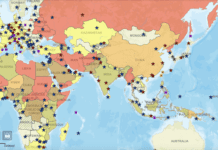
Planning abroad can seem risky, especially for meeting planners who are new to the task.
Luckily, in this Shakedown, Theresa M. Thomas, SVP for Powered by iJet, a business unit that provides risk management solutions, offers expertise for navigating global risk management.
Are there any unique threats that meeting and event planners should consider when planning abroad?
Hosting offsite events are a major undertaking for any organization whether meeting planners are hosting an offsite event domestically or internationally. Numerous actions and assessments must be completed to identify the event risk profile of the event. Threats to be considered include attendees that have lowered their inhibitions, a false sense that everything is being taken care of by the planner, unusual team building events, attendees that are easily targeted by kidnappers and hotels revealing the presence of their attendees.
What are some insights about travel risk management that meeting and event planners should be aware of when planning abroad?
The role of the meetings and events planner is evolving and requires more comprehensive strategic planning and consideration rather than just focusing on execution and logistics excellence. According to a leading meetings and events attorney, Tyra Hilliard, “Ignorance of the law is no excuse, you are held to know the laws of every country that you plan meetings in.”
“The role of the meetings and events planner is evolving and requires more comprehensive strategic planning and consideration rather than just focusing on execution and logistics excellence.”
It is not just how meeting and event planners respond, but whether they should respond. Laws vary in different countries and meeting and events planners have a duty to act if they know about an incident during a planned event, even if they did not personally witness the occurrence of the incident.
How do you determine and then prepare for risks while planning for a meeting or event?
Numerous actions and assessments must be completed to identify the event risk profile and develop appropriate risk mitigation measures. After risks are determined, planning should include performing a location and site assessment by engaging with subject matter experts, conducting a venue and hotel selection process, designating a risk management security point of contact, and reviewing emergency planning and preparation.
Special considerations should be made while preparing for an event in a high risk environment. Planners should consider past event history, setback distance, access control and security screenings, and local emergency services.
What do you think are the riskiest locations to currently plan meetings and events in and why?
Global risks and the potential impact to meeting and event planners are not isolated to areas where most would naturally assume to be more problematic or dangerous such as the Middle East. The WorldAware analyst team has seen a spike in threats in areas that are very common to business and leisure travelers, such as Europe, North America, Caribbean, and Asia.
In fact the Middle East, has been very consistent in the number of threats over the past five years. This makes travel risk management even more important because we are seeing threat activity that impact areas where meeting and event planners would have least expected five years ago.










